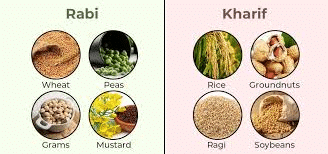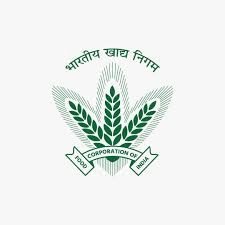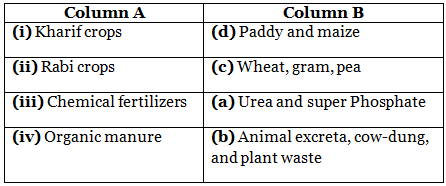Lakhmir Singh & Manjit Kaur: Crop Production and Management- 3 | Science Class 8 PDF Download
Long Answer Type Questions
Question 66 (a) What is meant by kharif crops ? Give two examples of kharif crops.
(b) What is meant by rabi crops ? Give two examples of rabi crops.
(a) Kharif crops: The crops which are sown in the rainy season are called kharif crops. The rainy season in India is generally from June to September.
Example: paddy, maize.(b) Rabi crops: The crops grown in winter season are called rabi crops. The winter season in India is generally from October to March.
Examples: wheat, gram, etc.
Q.67. (a) What is meant by ‘sowing’? What are the various methods of sowing the seeds?
(b) What precautions should be taken in sowing the seeds?
(a) Sowing is the process of putting the seeds in the soil. There are two methods of sowing the seeds in the soil. These are-
- Sowing by hand, and
- Sowing with a sand drill.
Sowing tree seeds
(b) Following precautions should be taken while sowing the seeds in the soil:
- The seeds should be sown at right depth in the soil suitable for germination.
- The seeds should be sown at proper spacing.
- The seeds should not be sown in highly wet soil.
- The seeds should not be sown in a dry soil.
Q.68. What are good quality seeds? You are given a sample of wheat seeds. How will you select good, healthy seeds for sowing ?
Good quality seeds basically mean the most competent seeds, which will definitely give rise to a healthy plant, which would bear more healthy seeds. This is important when you’re dealing with plants at a large scale, and you need to maintain crops for a large time frame.
Good Quality Seeds Best wheat seeds would be ones who’s color, shape and size are normal (not brownish, oddly shaped, tiny or bloated). Apart from just the looks, seeds are also tested for their efficiency in germination (how many seeds from set of 100 would grow in plants when sowed).
Q.69. (a) What is the process of ‘transplantation’ in agriculture? Give examples of two crops which are usually grown by this process.
(b) State two advantages of the process of transplantation in growing crops.
(a) The process of transferring the seedlings from the nursery to the main field by hand is called transplanting or transplantation. Some crops like paddy and many vegetables, the seeds are not directly sown in the field’s soil. In these crop, initially the seeds are sown in the small nursery to obtain seedlings. Seedlings are then transplanted into the regular fields placing them at a proper distance from one another.
The practice of transplantation is used in the cultivation of paddy crop and many vegetables like tomatoes and chillies.(b) Advantages of transplantation in growing crops:
- The process of transplantation helps in planting seedling at a proper distance from one another so that plants can get obtain adequate amount of water, nutrients and sunlight.
- The process of transplantation helps to select only healthy seedlings for the cultivation of crops.
Q.70. (a) What is irrigation? Why is irrigation necessary?
(b) Name the various sources of irrigation in our country.
(a) The supply of water to crops at right time is called irrigation. All the crop plants need water for their growth. Water is important for proper growth and development of flowers, fruits and seeds of plants.
Irrigation is necessary for the absorption of nutrients by plants from the soil. Water is absorbed by the plant roots. Along with water, minerals and fertilizers are also absorbed.
Irrigation is necessary to provide moisture for germination of seeds because germination of seeds does not take place under dry conditions.
Irrigation is also necessary for healthy crop growth so as to get good yield. Nutrients dissolved in water get transported to each part of the plant. Water also protects the crop from both frost and hot air currents.(b) The various sources of irrigation in our country are- wells, tubewells, ponds, lakes, rivers, dams and canals.
Multiple Choice Questions (MCQs)
Q.71. Which of the following crops would enrich the soil with nitrogen?
(a) Apple
(b) Pea
(c) Paddy
(d) Potato
Correct Answer is option (b)
The nitrogen-fixing bacteria present in root nodules of leguminous plants is rhizobium bacteria. Rotation of crops (leguminous and non-leguminous crops) in the same field replenishes the soil with nitrogen naturally and increases the soil fertility.
Q.72. Which of the following is not a kharif crop?
(a) Paddy
(b) Mustard
(c) Maize
(d) Groundnut
Correct Answer is option (b)
The crops which are sown in the rainy season are called kharif crops. The rainy season in India is generally from June to September. Example- paddy, maize.
Q.73. In agriculture, broadcasting is used for:
(a) Ploughing the fields
(b) Rotating the crops
(c) Removing the weeds
(d) Sowing the seeds
Correct Answer is option (d)
The sowing of seeds by hand is called broadcasting.
Q.74. Fish liver oil is rich in :
(i) Vitamin A
(ii) Vitamin B
(iii) Vitamin C
(iv) Vitamin D
(a) (i) and (ii)
(b) (ii) and (iii)
(c) (i) and (iv)
(d) only (iv)
Correct Answer is option (c)
Fish liver oil is rich in both vitamin A and vitamin D.
Note: (If you have to choose just one Answer:, select Vitamin D like in case of MCQs)
Q.75. Which of the following is not grown by transplantation?
(a) Chillies
(b) Tomatoes
(c) Peas
(d) Paddy
Correct Answer is option (c)
The process of transferring the seedlings from the nursery to the main field by hand is called transplanting or transplantation. Some crops like paddy and many vegetables like tomatoes and chillies, the seeds are not directly sown in the field’s soil.
Q.76. Which of the following is not a rabi crop?
(a) Soyabean
(b) Peas
(c) Wheat
(d) Linseed
Correct Answer is option (b)
The crops grown in winter season are called rabi crops.Examples: wheat, gram, etc.
Q.77. One of the following crop is not cultivated by sowing its seeds directly into soil. This one is:
(a) Wheat
(b) Gram (charm)
(c) Paddy
(d) Maize (makka)
Correct Answer is option (c)
The process of transferring the seedlings from the nursery to the main field by hand is called transplanting or transplantation. Some crops like paddy and many vegetables, the seeds are not directly sown in the field’s soil.
Q.78. Tomatoes are cultivated by the practice called:
(a) Transpiration
(b) Translocation
(c) Transportation
(d) Transplantation
Correct Answer is option (d)
Paddy, tomatoes and chillies are grown by transplantation.
Q.79. Which of the following cannot be provided to the soil by a chemical fertilizer?
(a) Nitrogen
(b) Humus
(c) Potassium
(d) Phosphorus
Correct Answer is option (b)
Nitrogen, phosphorus and potassium are chemical which can be provided to the soil by chemical substance called fertilizers whereas humus cannot. It is provided to the soil by natural substance called manure.
Q.80. Which of the following is not grown by transplantation?
(a) Chillies
(b) Tomatoes
(c) Paddy
(d) Papaya
Correct Answer is option (d)
Paddy, tomatoes and chillies are grown by transplantation.
Q.81. The Rhizobium bacteria present in the root nodules of pea plants can fix one of the following from the atmosphere. This one is:
(a) Hydrogen
(b) Oxygen
(c) Nitrogen
(d) Halogen
Correct Answer is option (c)
The Rhizobium bacteria present in the root nodules of pea plants can fix nitrogen.
Q.82. The process of beating out grains from the harvested wheat crop is called:
(a) Beating
(b) Crushing
(c) Threshing
(d) Weeding
Correct Answer is option (c)
The process of beating out grains from the harvested wheat crop is called threshing. It is done by a machine called combine.
Q.83. The food obtained from animals is very rich in:
(a) Fats
(b) Carbohydrates
(c) Minerals
(d) Proteins
Correct Answer is option (d)
The food obtained from animals is very rich in proteins.
Q.84. The Government Agency responsible for purchasing grains from the farmers, safe storage and distribution is
(a) CBI
(b) FBI
(c) FCI
(d) FDI
Correct Answer is option (c)
The government agency like food corporation of India (FCI) buy food grains from farmers and storing them properly.
Q.85. The process of removing unwanted plants from a crop field is called?
(a) Breeding
(b) Weeding
(c) Transplanting
(d) Harvesting
Correct Answer is option (b)
The removal of unwanted plants called weeds is called weeding.
Q.86. Poultry gives us:
(a) Eggs
(b) Meat
(c) Meat as well as eggs
(d) Honey
Correct Answer is option (c)
Poultry gives us meat as well as eggs.
Q.87. Which of following is not a correct statement for sowing seeds?
(a) Seeds should be sown at right intervals
(b) Seeds should be sown at right depth
(c) Seeds should be sown in dry soil
(d) Seeds should not be sown in highly wet Soil
Correct Answer is option (c)
Seeds should not be sown in dry soil because water is necessary for germination of seeds.
Q.88. Which of the following system of irrigation is preferred for the uneven land?
(a) Chain pump irrigation system
(b) Drip irrigation system
(c) Sprinkler irrigation system
(d) River irrigation system
Correct Answer is option (c)
Sprinkler system is more suitable for uneven land where sufficient water is not available.
Q.89. The two crops which are not grown by sowing their seeds directly into the soil in large fields are:
(i) Peas
(ii) Tomatoes
(iii) Chillies
(iv) Maize
(a) (i) and (ii)
(b) (ii) and (iii)
(c) (i) and (iii)
(d) only (iv)
Correct Answer is option (b)
The two crops which are not grown by sowing their seeds directly into the soil in large fields are tomatoes and chillies.
Q.90. The best Technique of Watering the fruit plants and Tree is:
(a) Chain pump system
(b) Sprinkler system
(c) Moat (pulley system)
(d) Drip system
Correct Answer is option (d)
In this system, there is a network of narrow pipes with small holes, in the fields. When water flows through these pipes, water falls drop by drop just at the position of the roots. So, it is called drip system. Water is not wasted at all. It is the best technique for watering fruit plants, gardens and trees.
High Order Thinking Skills (HOTS)
Q.91. Arrange the following practices in the correct order as they appear in the sugarcane crop production:
Sending crop to sugar factory; Irrigation; Harvesting; Sowing; Preparation of soil; Ploughing the field; Manuring.
The correct order is: Ploughing the field ; Preparation of soil, Sowing; Manuring; Irrigation; Harvesting; Sending crop to sugar factory
Q.92. Match items in column A with those in column B:

Q.93. Name two crops which are cultivated:
(a) by sowing seeds directly into fields.
(b) by transplanting.
(a) Crops wheat and gram can be cultivated by sowing seeds directly into fields.
(b) Paddy and tomatoes can be cultivated by transplanting.
Q.94. Farmers in Northern India grow legumes as fodder in one season and wheat in the next season.
(a) What is this practice known as ?
(b) How does this practice help in the replenishment of soil?
(a) Crop rotation
(b) The nitrogen-fixing bacteria present in root nodules of leguminous plants is rhizobium bacteria. Rotation of crops (leguminous and non-leguminous crops) in the same field replenishes the soil with nitrogen naturally and increases the soil fertility.
Q.95. A student lists the following agricultural practices for crop production:
Irrigation; Removal of weeds; Preparation of soil; Storage of food grains; Sowing; Adding manure and fertilizers
Which agricultural practice is missing from the above list?
Harvesting is missing from the above list.
|
90 videos|296 docs|44 tests
|
FAQs on Lakhmir Singh & Manjit Kaur: Crop Production and Management- 3 - Science Class 8
| 1. What are the different methods of crop production and management? |  |
| 2. How does irrigation help in crop production? |  |
| 3. What are the advantages of using high-yielding variety seeds in crop production? |  |
| 4. How do fertilizers contribute to crop production and management? |  |
| 5. What are the potential risks associated with the use of pesticides in crop production? |  |



















